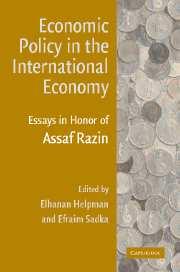Book contents
- Frontmatter
- Contents
- List of Contributors
- Preface
- Introduction
- PART ONE FINANCIAL ISSUES IN OPEN ECONOMIES: THEORY
- 1 Crises: The Next Generation?
- 2 Solutions (?) to the “Devaluation Bias”: Some Preventive Measures to Defend Fixed Exchange Rates against Self-Fulfilling Attacks
- 3 Growth-Enhancing Effects of Bailout Guarantees
- 4 Risk and Exchange Rates
- PART TWO FINANCIAL ISSUES IN OPEN ECONOMIES: EMPIRICS
- PART THREE ECONOMIC GROWTH: THEORY AND EMPIRICS
- PART FOUR PUBLIC ECONOMICS
- PART FIVE POLITICAL ECONOMY
- Author Index
- Subject Index
3 - Growth-Enhancing Effects of Bailout Guarantees
Published online by Cambridge University Press: 03 November 2009
- Frontmatter
- Contents
- List of Contributors
- Preface
- Introduction
- PART ONE FINANCIAL ISSUES IN OPEN ECONOMIES: THEORY
- 1 Crises: The Next Generation?
- 2 Solutions (?) to the “Devaluation Bias”: Some Preventive Measures to Defend Fixed Exchange Rates against Self-Fulfilling Attacks
- 3 Growth-Enhancing Effects of Bailout Guarantees
- 4 Risk and Exchange Rates
- PART TWO FINANCIAL ISSUES IN OPEN ECONOMIES: EMPIRICS
- PART THREE ECONOMIC GROWTH: THEORY AND EMPIRICS
- PART FOUR PUBLIC ECONOMICS
- PART FIVE POLITICAL ECONOMY
- Author Index
- Subject Index
Summary
Introduction
During recent balance of payments crises dramatic currency depreciations have coincided with meltdowns of the banking system. Because such crises have typically been preceded by lending booms, not by large fiscal deficits, it has been suggested that financial liberalization programs have been ill-conceived. These programs have often been implemented in an environment characterized by bailout guarantees. As a result, financial liberalization programs have often been followed by excessive risk taking and lending booms that have rendered economies prone to crisis. Moreover, in some policy circles it has been suggested that the adoption of fixed exchange rates has exacerbated the problem by inducing agents to denominate their debt in foreign currency on an unhedged basis.
The central theme of this paper is that, given the distortions faced by emerging markets, the financial liberalization policies of the late 1980s and the early 1990s can be considered as growth-enhancing, even if we accept that bailout guarantees were the inevitable consequence of such policies. Furthermore, we will argue that, conceptually, the boom–bust cycles experienced by emerging economies are independent of the exchange rate regime.
Several of the emerging economies that implemented financial liberalization had gone through decades of statism. Thus, at the time of reform the private sector was too small and financial markets were not well developed. In fact, bank credit was practically the only source of external finance for most firms in the nascent private sector.
- Type
- Chapter
- Information
- Economic Policy in the International EconomyEssays in Honor of Assaf Razin, pp. 52 - 73Publisher: Cambridge University PressPrint publication year: 2003



